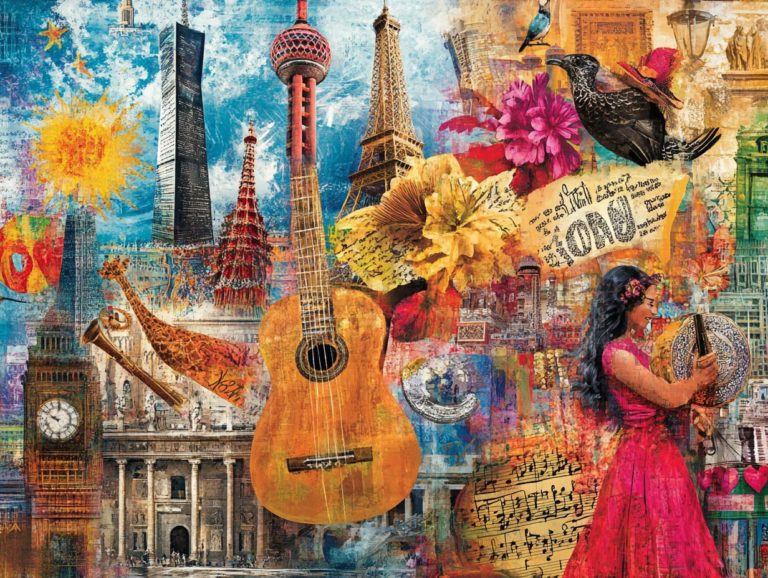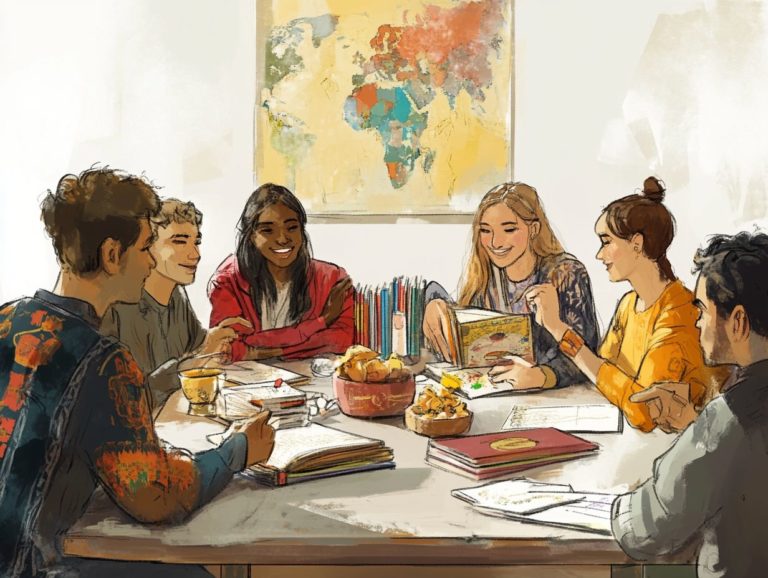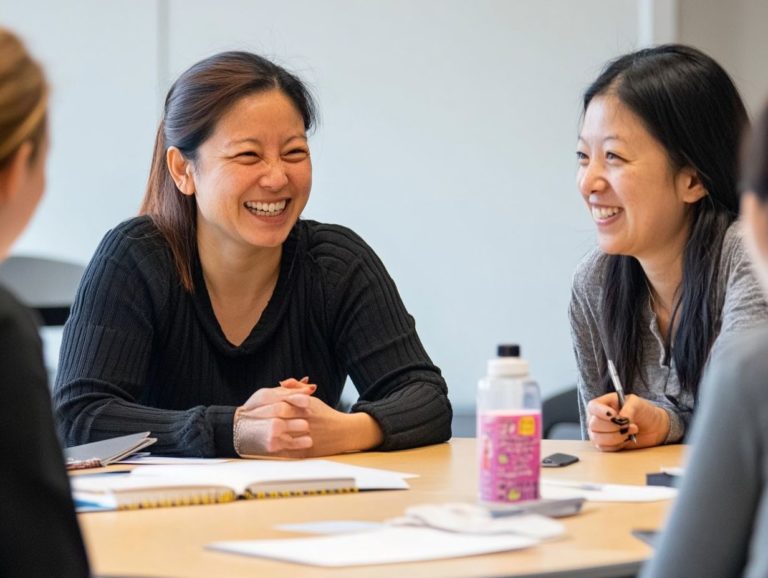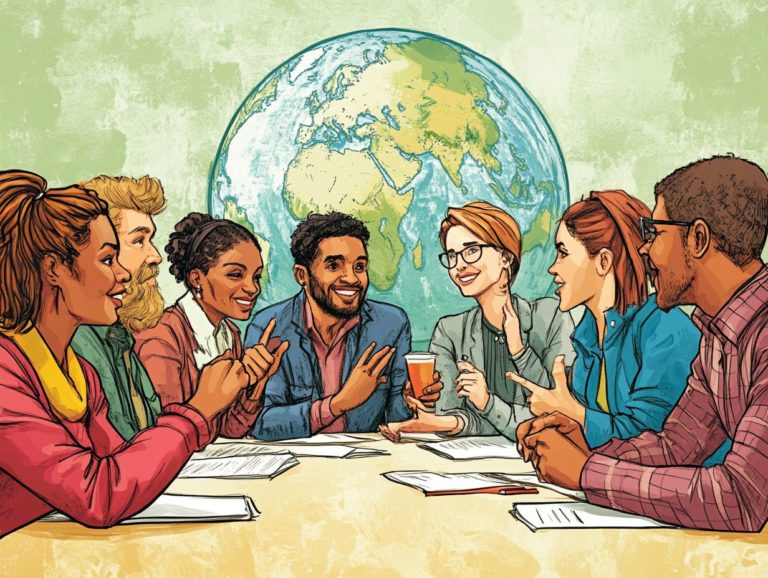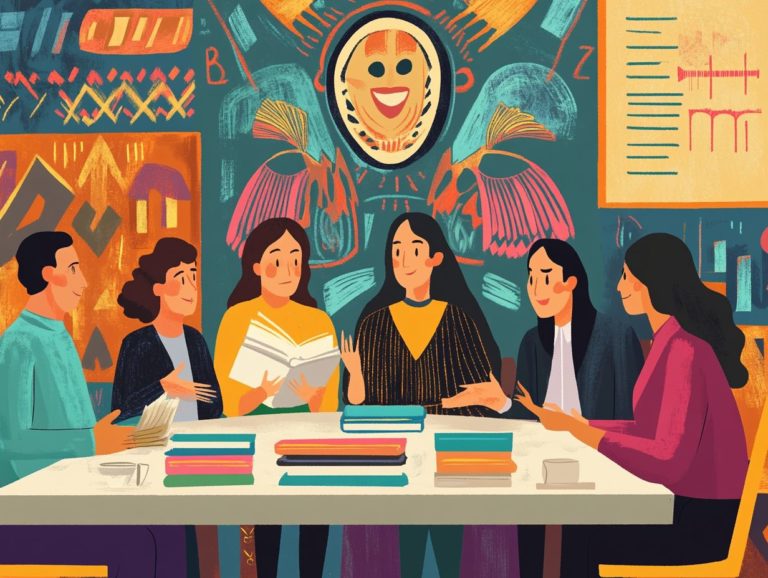5 ways to connect language learning with local culture
Language learning transcends the mere memorization of vocabulary and grammar rules; it s about forging a connection with the culture that breathes life into the language.
Immerse yourself in local communities, participate in vibrant festivals, savor traditional cuisine, delve into rich histories, and engage in conversation with native speakers to significantly enhance your language skills in ways that resonate deeply.
This article delves into five strategies designed to deepen your language learning experience through cultural connections, transforming your journey into something educational, enriching, and truly enjoyable.
Contents
- Key Takeaways:
- 1. Immerse Yourself in the Local Community
- 2. Attend Cultural Events and Festivals
- 3. Explore the Local Cuisine
- 4. Learn About the History and Traditions
- 5. Practice with Native Speakers
- Why Is It Important to Connect Language Learning with Local Culture?
- Enhances Understanding
- Promotes Inclusivity
- How Can Immersing Yourself in the Local Community Enhance Language Learning?
- What Can You Gain from Attending Cultural Events and Festivals?
- How Can Exploring the Local Cuisine Help with Language Learning?
- What Can You Learn from Studying the History and Traditions of a Culture?
- How Does Practicing with Native Speakers Improve Language Learning?
- Frequently Asked Questions
- What are the 5 ways to connect language learning with local culture?
- How can I immerse myself in the local culture while learning a language?
- What are some ways to practice with native speakers?
- How can I use cultural resources to enhance my language learning?
- What types of cultural activities should I participate in while learning a language?
- How can I incorporate cultural elements into my learning materials?
Key Takeaways:
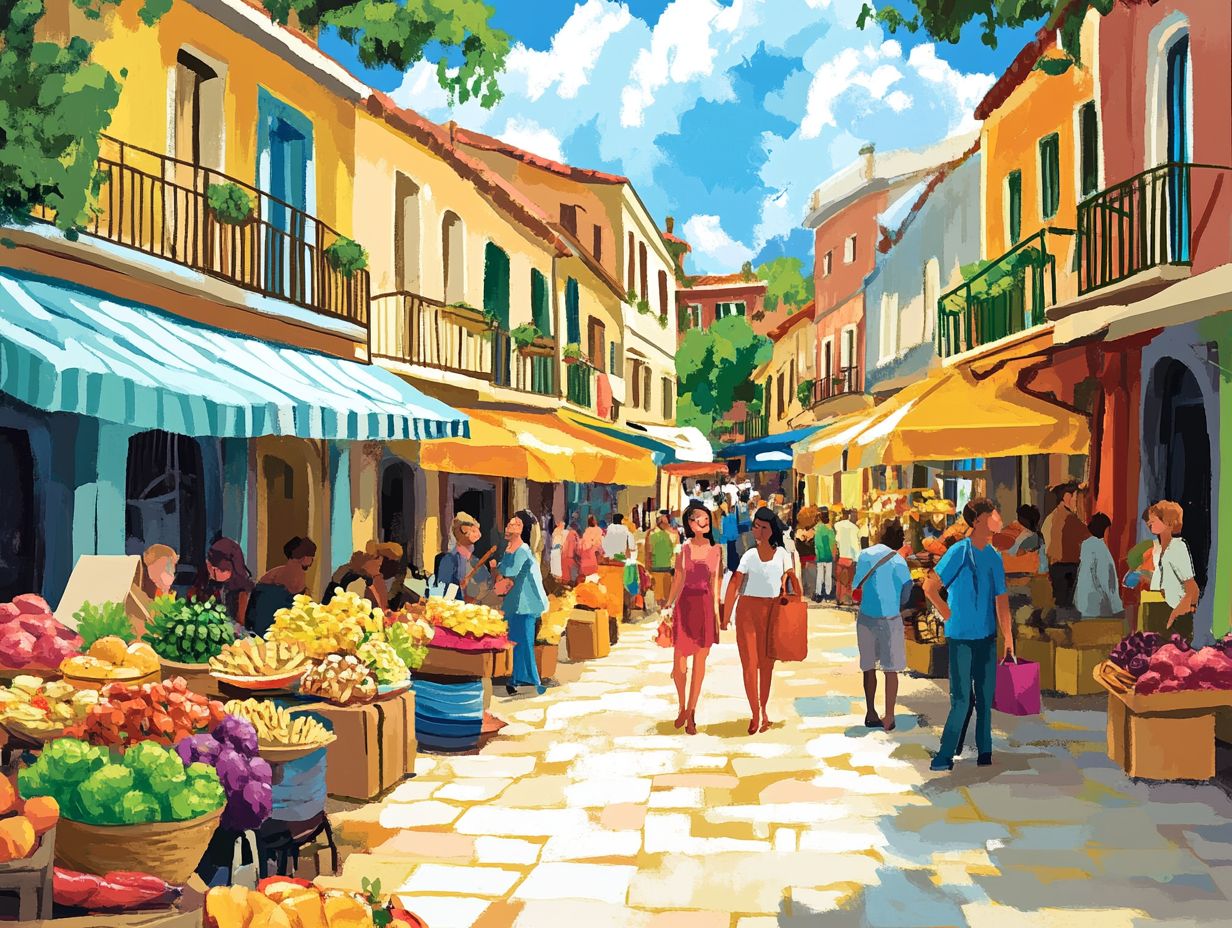
- Get involved in the local community to boost your language skills and cultural insight!
- Attend cultural events and festivals to dive into the language and customs of the local community!
- Explore local cuisine and unlock a delicious world of language!
1. Immerse Yourself in the Local Community
Immersing yourself in the local community can be a life-changing experience that enriches your language learning journey and deepens your understanding of cultural identity and social cohesion.
By engaging with local residents, you ll sharpen your linguistic skills, expand your knowledge of indigenous languages, and contribute to the preservation of linguistic diversity, all while forging connections that enhance your overall experience.
This collaborative environment promotes language acquisition and allows you to appreciate diverse cultural narratives that shape communication. Participating in community events like festivals, local markets, or workshops opens up invaluable opportunities to interact with native speakers and practice your language skills in authentic settings, but you can also explore 5 ways to immerse yourself in a language at home.
These interactions encourage sharing cultural traditions and perspectives, nurturing mutual respect. As communities come together to champion language conservation efforts, they underscore the intrinsic value of each language, ensuring future generations can embrace and celebrate their unique linguistic heritage.
2. Attend Cultural Events and Festivals
Attending cultural events and festivals is not just a celebration of cultural identity; it’s a fantastic opportunity to deepen your global awareness and elevate your language learning experience!
Imagine immersing yourself in contexts alive with authentic resources and genuine interactions! These vibrant gatherings invite you to engage with a rich tapestry of languages, traditions, and customs.
Take, for example, the lively Dia de los Muertos festivities in Mexico. They offer a glimpse into a unique tradition and a chance for you to interact with local dialects and partake in ancient rituals.
Similarly, events like Carnival in Brazil and La Feria de Abril in Spain allow you to revel in music, dance, and culinary delights while sharpening your Spanish communication skills. Such interactions promote social cohesion within communities and enrich your language capabilities, making the experience both fun and educational!
3. Explore the Local Cuisine
Exploring the local cuisine serves as a delectable gateway into the cultural tapestry of a region, allowing you to connect with cooking techniques, culinary vocabulary, and the rich history behind various dishes.
By participating in cooking classes or food tours, you engage directly with native speakers, further enriching your conversational skills in an authentic setting.
These culinary adventures equip you with practical knowledge about ingredients and methods while revealing how food embodies cultural identity and social traditions.
As you savor local flavors, you ll gain insight into the environmental practices tied to food production, linking your experience to broader themes in ecotourism. Ecotourism means visiting natural areas to appreciate and protect the environment!
Understanding how local cuisine is influenced by seasonal availability and sustainable practices cultivates a deeper appreciation for the land and its heritage, transforming language instruction into a truly dynamic and context-rich journey.
Start your cultural adventure today and watch your language skills soar!
4. Learn About the History and Traditions
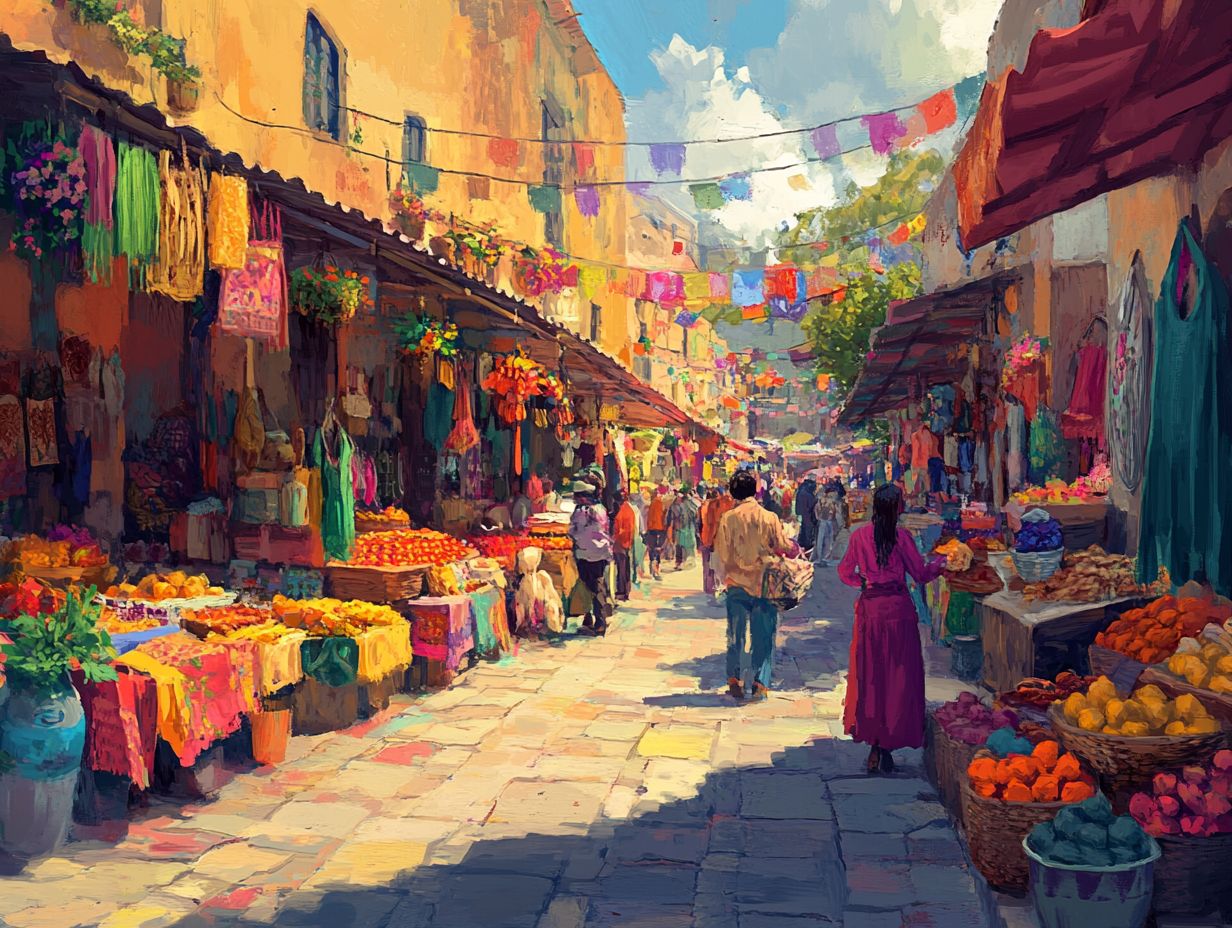
Delving into the history and traditions of a culture offers profound insights into cultural identity and helps combat bias. This journey gives language learners a deeper appreciation for indigenous languages and highlights the importance of knowledge conservation in shaping societal values.
As you explore, you enrich your vocabulary and connect to the narratives and expressions deeply rooted in a community’s experience. Understanding historical events can shed light on the nuances behind certain idioms or phrases, making them more relatable and meaningful.
Embracing these cultural narratives fosters an inclusive environment that celebrates diversity. This approach enhances your linguistic skills while encouraging respectful intercultural dialogues, paving the way for meaningful connections across global communities.
5. Practice with Native Speakers
Practicing with native speakers can drastically elevate your language skills don t miss out! It nurtures social cohesion and allows you to immerse yourself in the variety of languages spoken in a culture, benefiting both your mental health and academic performance.
Engaging with fluent speakers sharpens your practical skills and deepens your cultural understanding, transforming the learning experience into something vibrant and meaningful.
Several methods can facilitate these invaluable interactions, including:
- Participating in language exchange programs
- Inviting guest speakers from diverse backgrounds
- Attending community events centered around cultural exchange
These opportunities cultivate a dynamic atmosphere where you can practice speaking in real-world contexts, significantly boosting your confidence.
Such social interactions alleviate feelings of isolation often tied to language learning, fostering a sense of belonging and enhancing your overall mental well-being.
Why Is It Important to Connect Language Learning with Local Culture?
Enhances Understanding
Connecting language learning with local culture is essential for nurturing a deep understanding of linguistic nuances and cultural identity. This enhances your global awareness and plays a significant role in conserving languages, especially in the context of International Mother Language Day and multilingual education initiatives worldwide. Additionally, exploring 5 ways to incorporate games in language learning can make this process even more engaging.
Promotes Inclusivity
By blending language acquisition with cultural experiences, educators create an enriching environment where you grasp not just vocabulary and grammar but also the values and traditions woven into your community. This approach invites you to see language as a vibrant entity shaped by history and social dynamics, ultimately fostering linguistic inclusivity and showcasing how to explore cultural heritage through language learning.
Immersion in local contexts equips you with the adaptive capacity to navigate diverse social landscapes with ease. When cultural identity becomes the foundation of language instruction, you re likely to engage more deeply, leading to improved academic performance and positive social interactions as you navigate your bilingual or multilingual world.
How Can Immersing Yourself in the Local Community Enhance Language Learning?
Immersing yourself in the local community can significantly elevate your language learning experience. It provides you with authentic resources and fosters social cohesion, allowing you to practice your language skills in real-world contexts. Additionally, there are 7 ways to make language learning fun while building meaningful relationships that deepen your understanding of the culture.
This involvement can manifest in various ways, such as volunteering for neighborhood organizations, participating in local festivals, or joining cultural groups that celebrate diversity.
For example, volunteering at a community center enhances your conversational skills and introduces you to subtle idiomatic expressions and cultural references that you’d never encounter in a traditional classroom setting.
Participants often share how engaging with native speakers alleviates intimidation, creating a safe space for making mistakes and learning. By attending events like local farmers’ markets or cultural fairs, you can interact with the community, gaining insights into customs while honing your language skills in vibrant, authentic environments. Additionally, consider these 7 tips for balancing language and culture to enhance your experience.
What cultural experiences can you explore today?
What Can You Gain from Attending Cultural Events and Festivals?

Attending cultural events and festivals deepens your understanding of cultural identity. These events also present unique opportunities to enhance your language skills through immersive experiences rich with music, food, and traditional practices.
Imagine the vibrant atmosphere of a local harvest festival, where the region’s culinary delights are on full display. You can strike up conversations with vendors and fellow attendees about recipe techniques and the origins of ingredients, enriching your vocabulary.
Dive into traditional dances that tell stories through movement. These experiences invite you to explore cultural nuances that often require communication and collaboration.
Anecdotes from previous attendees highlight how sharing a meal at a communal table fosters connections. This transcends language barriers and creates a genuine sense of belonging.
Such experiences break down social boundaries and cultivate your linguistic fluency in authentic contexts. They transform the learning process into something enjoyable and effective.
How Can Exploring the Local Cuisine Help with Language Learning?
Exploring local cuisine is an enriching way to elevate your language learning journey. It provides authentic resources, helps you grasp cooking techniques, and offers insights into the cultural contexts shaping cooking traditions, as highlighted in 5 ways to experience local culture while learning.
By integrating culinary vocabulary and expressions, you can immerse yourself in the language while uncovering food-related terminology. Engaging in cooking classes or food tours allows you to practice your language skills interactively as you navigate recipes and ask questions.
This hands-on approach reinforces your vocabulary and deepens your cultural appreciation. Learning the language alongside cooking creates memorable experiences that extend well beyond the classroom.
What Can You Learn from Studying the History and Traditions of a Culture?
Diving into a culture’s history opens up a world of fascinating insights into cultural identity and the preservation of knowledge. It deepens your appreciation for linguistic diversity and the rich narratives that shape language.
As you immerse yourself in specific cultural practices, you can uncover unique language elements that often accompany these traditions. For example, consider the Japanese practice of Hanami, where individuals celebrate the blooming of cherry blossoms. This celebration is filled with specific vocabulary related to nature and social gatherings.
Exploring Indigenous harvest festivals can introduce you to specialized terms that connect deeply with agriculture, community, and gratitude concepts rooted in the history and identity of those peoples.
Through such explorations, your journey in language acquisition becomes more than just learning vocabulary. It transforms into a meaningful connection with the cultures that give life to those words.
How Does Practicing with Native Speakers Improve Language Learning?
Practicing with native speakers is essential for effective language learning. It nurtures social cohesion and elevates your engagement by offering real-time feedback and culturally rich interactions.
Participating in language exchange programs or attending local community events can significantly enhance these benefits.
By immersing yourself in environments where your target language is actively spoken, you enter authentic dialogues. This transforms your learning from mere vocabulary drills into a vibrant exploration of real-life context.
These experiences foster cognitive connections, helping you grasp nuances and common phrases with greater ease.
Building relationships with native speakers promotes linguistic skills and encourages emotional growth as you navigate cultural differences. This deepens your understanding and appreciation of the language, transcending the basics of syntax and grammar.
Frequently Asked Questions
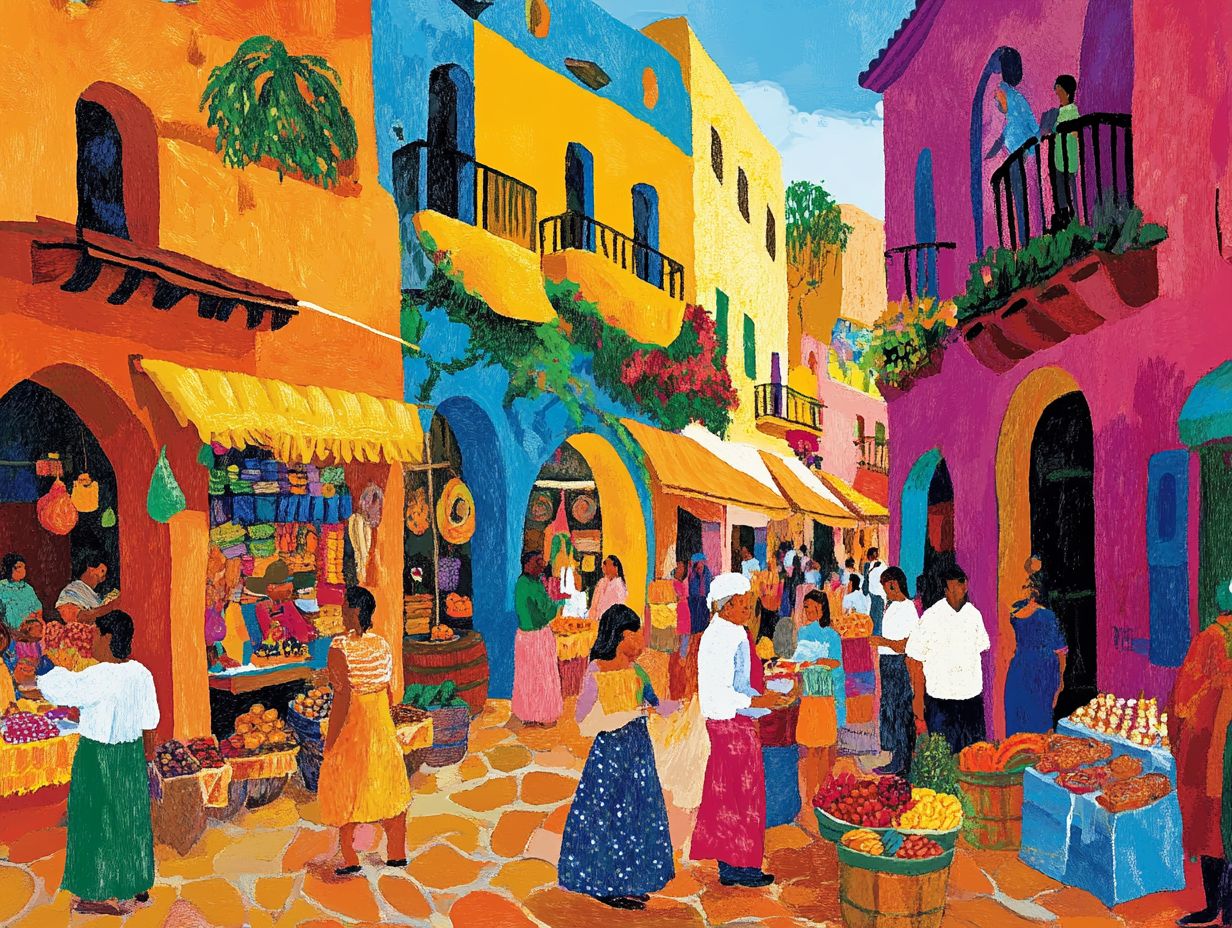
What are the 5 ways to connect language learning with local culture?
You can connect language learning with local culture by getting involved in the culture, practicing with native speakers, using cultural resources, joining cultural activities, and adding cultural elements to your learning materials.
How can I immerse myself in the local culture while learning a language?
Live with a host family and attend cultural events or festivals. Explore local markets and shops outside of tourist areas.
What are some ways to practice with native speakers?
Join conversation groups to practice with native speakers. You can also find language exchange partners or attend classes taught by native speakers.
How can I use cultural resources to enhance my language learning?
Use books, movies, music, and podcasts to experience the language and culture. Visiting museums and historical sites can also deepen your understanding.
What types of cultural activities should I participate in while learning a language?
Participate in activities like cooking classes or traditional dance lessons. These experiences not only help you learn the language but also provide insights into cultural exchange and deepen your appreciation of the local culture.
How can I incorporate cultural elements into my learning materials?
Use authentic materials like newspapers, TV shows, and social media posts. Include cultural topics in your language lessons for a richer experience!

